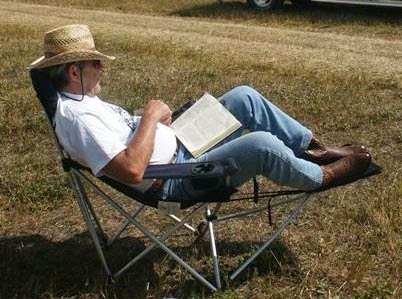The following incident occurred 15 or so
years ago when I taught at the College of Biblical Studies in Houston. CBS is a college that was originally founded
to give Biblical and Theological training to African-American ministers and
other leaders in the black community.
Though it has diversified since its beginnings, the majority of its
students is still African-American, though ironically many of the faculty and
most of its wealthy supporters are white.
(While my memory may have failed me on some of the details, I believe
the story is basically accurate.
Anyway, I'm sitting having coffee with 3 or 4 students; I'm the only white guy at the table.
Anyway, I'm sitting having coffee with 3 or 4 students; I'm the only white guy at the table.
One of the students cheerfully informs us,
"They asked me to give my testimony at the fund-raising banquet."
"Wow, that's great!" replies
another. "What you goin' to
tell?"
"I'm goin' to tell how the Lord saved me
and I'm goin' to tell about how this school has been such a help in my spiritual
growth."
"Make sure you tell 'em about the
drugs," says another, older student.
Smirks appear on the other faces (including mine).
"Drugs?" says the first.
"Yeah," says the other. "You got to tell them how you were saved
from drugs." The smirks turn to
grins.
"But I ain't never done drugs!" was
the indignant reply.
"Look" says his self-appointed coach. "That don't make no difference! There's two things them rich white folks want
to know about us black folks. First,
that we been saved from drugs, 'cause we all are on drugs! And the other thing they want to know is that
we ain't goin' after their daughters!"
Well, this white guy almost choked with
laughter, as did the others at the table, except for the deflated young
testifier. However, later as I pondered
the conversation I'd heard I was deeply saddened at how true the
"coach's" insights were. For
quite some time I had recognized the truth of what was so cynically expressed,
though I was hesitant to admit it.
On a previous post, AMERICA IN DENIAL, I spoke of the racism that permeates
not only our white American culture, but also the church. I spoke of how we all can find ourselves
somewhere on a continuum of racism. I
spoke of our need as the church for repentance, not only of the racism within
us but also of its accompanying twin: denial.
I mentioned some of our trite ways of excusing ourselves. After posting this I learned of some new
ways, not only of denying one's personal racism, but of denying that racism
even exists.
In my own experience I have found some of the
most ludicrous denials of racism coming from those who are most involved in
ministry across racial lines. I am
speaking as one who has spent many years attempting to cross racial barriers,
as one who has sought to bring about what used to be known as "racial
reconciliation." After all, we might
say, aren't we white people the ones who are making an effort to cross these
lines? To "minister" to these
people in their need - for the Gospel, for education, for whatever else? Yes, but what is our motive for this
service? Does our service reinforce our
feelings of racial superiority? After
all, aren't we the ones with something better to give?
I have heard my white co-workers, my white
fellow ministers making of-the-cuff racist remarks or using racial stereotypes,
often unwittingly. And I suppose that I
have been guilty of the same. I have
also heard those of other races express their distrust of white people, as the
above episode illustrates. Is our racism
more obvious to those to whom we minister than it is to us?
As I said before, I am pessimistic of any
real change in America's situation.
Though we must continue to work for social justice and racial
reconciliation, we must also recognize this fact. However, we as the church, we
who claim allegiance to Christ need to rise above the racism of America. If there is to be change, it must begin with
us.
Perhaps we need to ask ourselves some pointed
questions:
-- Do we really believe that Christ died to
reconcile us to God and to our fellow human beings?
-- Do we really believe that in Christ
"there is neither Greek and Jew, circumcision and uncircumcision, barbarian,
Scythian, slave and free" (Colossians 3:11), that "there is no Jew or
Greek, there is no male or female" (Galatians 3:28)? How about black and
white?
-- Do we really believe that we have an
obligation to love our neighbor as ourselves?
-- Do we really believe that Jesus commanded
us to make disciples of ALL the nations?
This is not and should not be a matter of political preference or regional upbringing. This is at the heart of what it means to be a follower of Christ.
This is not and should not be a matter of political preference or regional upbringing. This is at the heart of what it means to be a follower of Christ.
The Second Person of the Trinity stepped
outside the comfort zone of Heaven to become one of us. If I may say, He crossed racial barriers to
become one with those who were his enemies.
The Apostle Paul apparently felt that as a
follower of Jesus, he needed to cross those barriers as his Lord had done. "For
though I am free from all, I made myself a servant to all that I might win the
more ... I have become all things to all that I might same some" (1 Corinthians
9:19, 22a). He lists those he has
"become as".
Are we willing to confess our racial pride and
fears and become a "servant of all" even of those who are different,
who may be suspicious of us, even hate us?
